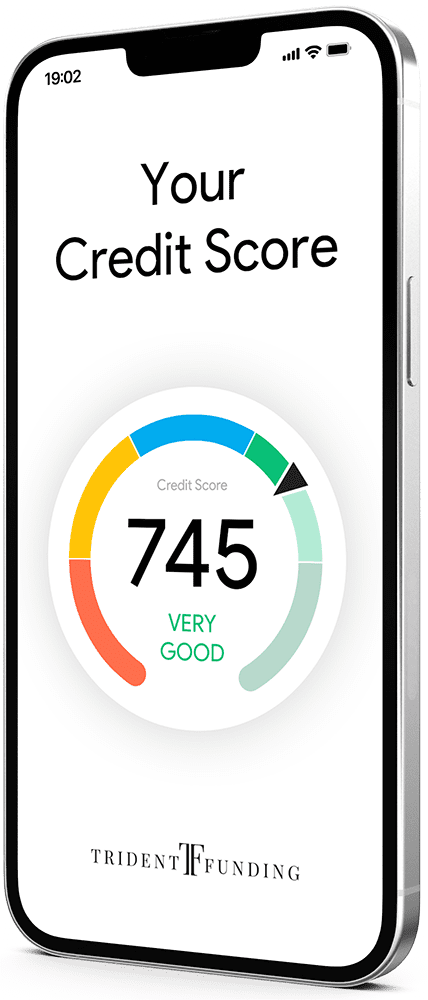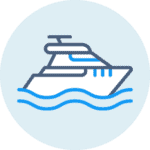
How to Apply for a Boat Loan
So, you’re ready to join the illustrious boat owners club? You can already picture yourself pulling out of the marina, enjoying a nice breeze, and
Get matched with a loan that fits your budget and lifestyle
If you know your boat loan budget, it’s time to shop for your perfect boat! Once you find it, check current interest rates.
Buying a boat can be an exciting experience. It can also be expensive. A boat is also usually a large purchase, second only to a primary residence, so most people who buy boats will get a loan to fund this major expense. A boat loan is a type of loan used to finance the purchase of a boat, such as a yacht, sailboat, or fishing boat. Boat loans are similar to other types of loans, such as auto loans or home mortgages, in that they provide borrowers with the funds needed to purchase the asset upfront, and then require the borrower to repay the loan over time, typically with interest.
Boat loans are typically secured loans, meaning that the boat serves as collateral for the loan, which can help lower the interest rate on the loan. Boat loans can be obtained from a variety of lenders and the terms and conditions of the loan will depend on the borrower’s credit history, the amount of the loan, and the length of the loan term.

Boat loans aren’t hard to get, but each lender will have their own set of boat loan requirements. You don’t have to have perfect credit or make a million dollars to get a boat loan. You will generally need a credit score of at least 600, enough money for a down payment of 10 to 20 percent of the cost of the boat, and you should be able to prove that you can afford the boat loan payments. If you’re not sure if you qualify for a boat loan, use a boat loan calculator to see how much boat you can afford and your estimated monthly payment.

If you’re new to the boat financing process, you may wonder how boat loans work. There are a few important things you should know right up front. A boat loan works much like an auto loan but for a longer time period. Typically, boat loan terms range from 10 to 20 years. This is the length of the loan and the time period you have to pay off the loan.
This boat loan term is determined by a number of factors including the borrower’s credit score, the age of the boat, and the cost of the vessel. Typically, more expensive boats have longer loan terms, which make the monthly payments more affordable because they’re spread out over a longer period of time. For example, a $1 million yacht may have a 20-year loan term and a $50,000 fishing boat may only have a 10-year loan term. It’s important to choose a boat loan term that works best for your budget and your goals. Additionally, consider any fees or charges associated with your loan, such as origination fees, closing costs, and pre-payment penalties.
If you’re a well qualified buyer with a good credit score, you may have some say over your loan term. If you can manage higher monthly payments and want to pay the loan off as quickly as possible to avoid extra interest, then you can choose a shorter term. And vice-versa, if you want your monthly payments as low as possible, you may want to choose the longest term available.
While boat loans aren’t necessarily hard to get, you still need to be qualified. Each lender will have their own set of boat loan requirements. Just remember, boat loans aren’t hard to get if you pay your bills on time, have consistent income, can afford a boat, and have a good credit score. Boat loans are generally more difficult to get than auto loans but easier than a home mortgage.
In addition to loan terms, you should also know about a boat loan rate. This is the interest rate, you, the borrower, are being charged to borrow money from the lender to purchase the boat. You’re agreeing to pay back the loan amount plus the agreed upon interest during the loan term. Boat loan interest rates can vary greatly, so it’s important to compare rates from multiple lenders in order to find the best deal. You should also consider the size of your down payment, as this can affect the overall cost of your loan and your monthly payments.
The boat serves as collateral for the lender, in the unlikely event that you don’t pay back the loan, and nothing can be worked out. Boat loan rates vary by market conditions, the age and price of the boat, as well as the borrower’s credit score, and overall financial profile. As of July 2023, Trident Funding offers rates starting at 7.12% for well qualified borrowers with great credit scores.
When you’re ready to apply for a boat loan, there are a few requirements you need to meet. Lenders will typically require proof of income and good credit, as well as documentation about the boat you’re purchasing, such as its make and model, year, and value.
If you’re in the market for a brand new boat, it’s time to check out new boat loans so you can afford to buy that dream boat without straining your finances. The benefit of new boat loans is that marine lenders typically consider new boat loans to be less risky than used boat loans so they offer better rates and more favorable terms on new boat loans. Interest rates for new boat loans are typically lower than those for used boat loans because new boats generally hold their value better than used boats. Since new boats are more expensive than used boats, you can usually get a higher loan amount for new boat loans versus used boat loans. Also because new boats are expected to have a longer lifespan than used boats, loan terms for new boat loans are often longer than those for used boat loans.
Loans for used boats are offered by a variety of marine lenders and provide financing whether you’re buying a lightly used wakeboard boat or a 15-year-old center console. A used boat loan is a type of loan that is used to finance the purchase of a pre-owned boat. Used boat loans work in the same way as new boat loans, providing borrowers with the funds necessary to purchase the boat upfront and requiring them to repay the loan over time, typically with interest. Used boat loans may have higher interest rates than new boat loans, since pre-owned boats may have a higher risk of mechanical issues or other problems. However, borrowers may be able to secure lower interest rates by making a larger down payment, having a good credit score, and selecting a shorter loan term.
Secured boat loans require you to put up collateral, such as your boat, to secure the loan. This is called the collateral. The collateral, or boat loan in this case, secures the debt, so the boat serves as collateral for the lender. Secured boat loans usually offer lower interest rates, which make them more affordable for borrowers. However, if you default on the loan, you risk losing your boat as collateral. We always recommend understanding your personal financial situation and your ability to repay the loan before choosing between a secured or unsecured boat loan.

Please contact us with your specific questions and for current rate information. Let us take the guesswork out of finding the right lender, and help you sail through the process of financing a boat!



So, you’re ready to join the illustrious boat owners club? You can already picture yourself pulling out of the marina, enjoying a nice breeze, and

Boat loans are often used by people to finance their purchase of a boat. These loans typically have an amortization schedule that can last for

Consumer interest in boats has grown exponentially in recent years, according to the National Marine Manufacturers Association. This has resulted in record-breaking boat sales, increased

The decision to buy a boat can be one of the most exciting financial moves you make, whether you’re buying a weekend fishing boat or
There are few simple ways you can apply for boat financing. We offer an online boat loan application or we invite you to contact one of our Trident Funding locations. The quickest way to get approved for a boat loan is to complete an online application. Our team will be notified immediately once we receive your application, and we will begin the process of getting you approved and on the water!
When you apply for a boat loan, have your tax returns and bank statements available to show your financial ability to repay. These materials will need to be submitted to speed up the review process. You’ll also need to supply information about the boat you’d like to purchase, including make, model, year, length, etc.
We do not finance liveaboards, but we do offer boat loan financing on various other boats including center consoles, yachts, fishing boats, deck boats, pontoon boats, and sailboats.
Each situation is unique, and we may be able to fund your boat or yacht loan while the boat is overseas. Contact a sales representative at one of our nationwide locations and they will be happy to discuss your specific transaction to see if we can assist, or if we’d need to wait until the boat is in U.S. waters.
Different boat loans have different criteria, but typically, a marine lender wants to see a debt-to-income ratio of no more than 40-50% including your boat payment. The lower your debt to income ratio, the better. A lower ratio means you’re eligible for more competitive rates, better terms, and it may even mean lower lender fees.
A debt-to-income ratio (DTI) is calculated by adding up all of your monthly debt payments and dividing them by your gross monthly income. It’s a comparison of how much you owe (payments) with how much you earn (income). Expressed as a percentage, this calculation that compares your income to your debt gives lenders an idea of what the risk would be to lend you money for a boat loan. The lower the DTI the better because consumers with higher DTI ratios are generally viewed as riskier borrowers because they may have difficulty repaying a loan in full or making monthly payments.
Here’s an example of how to calculate your DTI:
Your monthly payments = $2,000
Your monthly income = $8,000
Your DTI ratio = 25% (2,000/8,000=0.25)
Boat loans aren’t necessarily hard to get; you just need to be qualified. You don’t have to have perfect credit or make a million dollars to get a boat loan. However, you will generally need a credit score of at least 600, enough money for a down payment of 10 to 20 percent of the cost of the boat, and you should be able to prove that you can afford the boat loan payments.
You will need to show at least two years of employment history, consistent income, and a relatively low debt-to-income ratio. Additionally, lenders will look at your payment history, your tax returns, and sometimes your bank statements. You can apply online with Trident Funding in just a few minutes and see if you’re approved within 48 hours.
After you submit your boat loan application, it is best to hold off on any big purchases, if possible, until the loan is funded. There are a few things you should avoid during the loan process, including applying for new credit cards (also keep all existing credit card accounts open), do not max out existing credit cards, do not buy a new car or do a trade in. It is best to keep in touch with your boat loan officer to ensure you are taking the right steps to close the deal on time.
Most boat loans require a down payment of 10% to 20%. For example, if you’re purchasing a boat for $75,000, you may be asked to put down $7,500 to $15,000. The down payment requirements vary based on the loan amount and the borrower’s qualifications. Feel free to contact one of our knowledgeable loan officers to help answer any questions you have regarding boat loan down payments. Trident Funding also offers zero down boat financing for loans up to $100,000.
There can be a prepayment penalty on boat loans depending on the lender and the loan amount. Boat loans have an expected payoff date, and if you pay off your loan before that date, you may be charged a prepayment penalty. A prepayment penalty is a fee that banks or lenders charge if you pay off your loan early. The amount and if the penalty exists will be stated in your boat loan documents and will be listed under the prepayment penalty clause. It’s a good idea to ask the lender upfront about all loan-related fees including a prepayment penalty, so there aren’t any nasty surprises later on.
While there is no federal tax imposed on a boat purchase, there are state and local taxes. In many cases you can finance the sales tax on your boat or yacht purchase within your loan. We recommend checking with your local state office to see if they have any specific requirements. The sales-tax rate varies from state to state. Some states do not require a sales tax at all when you purchase a boat or a yacht, and in some states, sales tax is only applied up to a certain amount of the boat’s purchase price. Other factors such as lending limits, down payment, and amount financed can impact whether you can finance the sales tax on your boat purchase.
Yes, we offer stated income boat loans up to $250,000! A stated income loan means the lender does not verify a borrower’s income using any records, such as paystubs, W-2 (employee income) forms, tax returns or other records. Borrowers are just asked to state their income, and lenders take them at at their word. However, we would likely need to request further verification in certain circumstances depending on your FICO score or boat loan structure.
Although U.S. Coast Guard documentation is not required for a boat loan, when financing your boat, most lenders will require the boat is U.S. Coast Guard documented. If the lender does not require USCG documentation, they may still provide better terms if you agree to have the boat documented with the Coast Guard. U.S. Coast Guard documentation is generally only required by marine lenders on transactions of certain sizes as well as for boats of certain tonnage that meet USCG requirements.
We assist with all aspects of documentation, registration and tilting when you finance your boat loan through Trident Funding. From loan application to funding, we help answer any questions you have and connect you with any third-party services required to get your boat loan funded to get you on the water!
Our network of marine lenders generally offers used and refinancing on boats as old as 20 years. We work with you to get the best boat loan rate on any new or used boat purchase.
Yes, lenders generally require a marine survey on used boats or yachts when you take out a boat loan. This allows the lender to confirm the boat’s condition and verify other items (registration, hull, and engine numbers) before they approve boat loan funding. Marine surveys also provide customer insight into potential future costs of ownership (i.e. fixes, improvements, etc.) and also help owners determine if they are carrying the proper amount of insurance coverage.
We recommend all used boat buyers hire a marine surveyor to verify the boat’s condition prior to purchase. You can check with the National Association of Marine Surveyors and the Society of Accredited Marine Surveyors. Members of these two national organizations provide marine survey services.
Yes, you may be able to refinance your boat loan if you want to lower your monthly payments or if you want to pay off your loan faster. Refinancing a boat loan may require you to reapply for the loan and may involve additional fees.
If you default on your boat loan, the lender may repossess the boat and sell it to recover their losses. Defaulting on a boat loan can also have negative impacts on your credit score and may make it more difficult for you to obtain financing in the future.

Subject to loan program requirements and credit approval. Certain fees, closing costs, and restrictions may apply.
Michigan Regulatory Loan License (RL-0024092), effective May 19, 2022, issued by Department of Insurance and Financial Services.
Contact: Office of Consumer Finance, 530 W. Allegan Street, 7th Fl., Lansing, MI 48933-1521, (877) 999-6442.
@ 2024 Trident Funding, LLC | NMLS ID 1740883 | NMLS Consumer Access